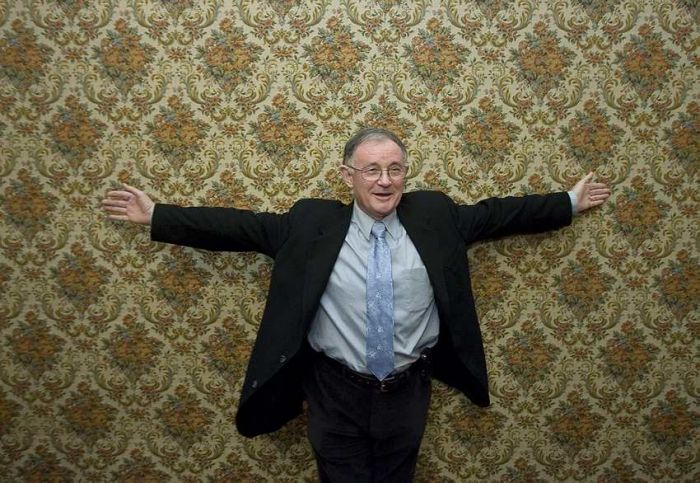Several faces of Professor Wiktor Osiatyński
Sometimes serious, very often smiling. Always - understanding. That was the Professor's very own face, he did not lose his cool approach even for a single moment. Other faces of Professor were visible in the speakers' faces, who indeed were coming from very diverse backgrounds.
We could hear the founder of Helsinki Human Rights Foundation, Mrs Halina Bortnowska; many scholars and lawyers from different universities in Poland and Europe who gave a moving testimony about a need of HRs protection, also prof. Ewa Łętowska, the very first Polish ombudswoman in the history, mocking smartly of everyone, Mrs Wanda Nowicka, a feminist and reproductive rights activist, we could hear prof Płatek criticizing the police approach towards rape victims.
Silence doesn't mean yes
 What I found definitely shocking, was the quota of female speakers, speaking about women problems. Probably the most actual and burning issue is the attitude of the society towards rape crime and rape victims. It is also the fault of legal provisions, that accentuate the prevention mechanisms (quotation of police hints: never wear sexy clothes, never go to the clubs, never walk alone in a dark alley, never dance with a man and never smile him ...) and involves kind of ban for femininity. Professor Monika Płatek, specializing in penal law, proposed rather innovative concept of the sexual autonomy, instead of sexual liberty. This concept, introduced and evolving then in the legal doctrines, should influence the legislation and start to be a remedy for the Human Rights violations such as domestic violence, rapes, femicide, sextortion, etc.
What I found definitely shocking, was the quota of female speakers, speaking about women problems. Probably the most actual and burning issue is the attitude of the society towards rape crime and rape victims. It is also the fault of legal provisions, that accentuate the prevention mechanisms (quotation of police hints: never wear sexy clothes, never go to the clubs, never walk alone in a dark alley, never dance with a man and never smile him ...) and involves kind of ban for femininity. Professor Monika Płatek, specializing in penal law, proposed rather innovative concept of the sexual autonomy, instead of sexual liberty. This concept, introduced and evolving then in the legal doctrines, should influence the legislation and start to be a remedy for the Human Rights violations such as domestic violence, rapes, femicide, sextortion, etc. Human Rights in practice
Professor Osiatyński, glorious receiver of the Order of Polonia Restituta (Krzyż Komandorski Orderu Odrodzenia Polski) on that day, is not only the famous Human Rights thinker and sociologists, but also a great fan of music, women and poetry. He is also a great humanist – two things that shocked me was the presence of his daughter and grand son. Sitting in the very first row, they were the living example of the open spirit of professor, his love and devotion for family.
 Another detail, that I found absolutely astonishing, is the spirit of truth and modesty, and also power, with which the professor was talking about his alcohol addict. Professor Osiatynski, the man of numerous virtues and great courage, gave evidence of his eager and hard struggle for sobriety and consciousness. In fact, in Poland, alcoholism is collecting the dark harvest of human rights violations of sexual liberty, domestic violence, right to personal integrity. Probably, for many people, this would be much stronger proof than his book, of his deep humanism.
Another detail, that I found absolutely astonishing, is the spirit of truth and modesty, and also power, with which the professor was talking about his alcohol addict. Professor Osiatynski, the man of numerous virtues and great courage, gave evidence of his eager and hard struggle for sobriety and consciousness. In fact, in Poland, alcoholism is collecting the dark harvest of human rights violations of sexual liberty, domestic violence, right to personal integrity. Probably, for many people, this would be much stronger proof than his book, of his deep humanism. Human factor
To end with - as prof. Jerzy Zajadło mentioned at the very beginning of the conference – to write a good book on human rights – we need knowledge, experience, perspective of understanding and the legal workshop. However , to write a very good book, to that set of conditions we should add the compassion. Is it indispensable only to write excellent books on human rights?
